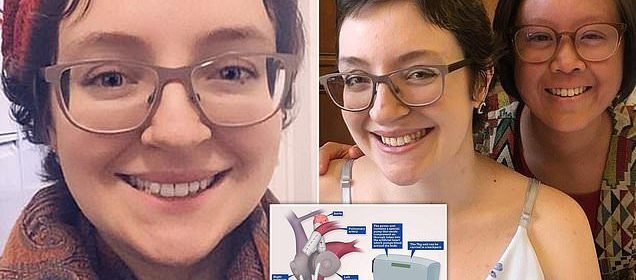Oxford student who carried an artificial heart in a rucksack dies

‘Wonderful’ Oxford student, 24, who carried around an artificial heart in a RUCKSACK dies after complications during transplant surgery
- Rebecca Henderson was given the pioneering 15lbs (7kg) device in 201
- She recently had a heart transplant after being cancer-free for a year
- But she died on Wednesday due to complications with the risky procedure
A student who carried around an artificial heart in a rucksack has died aged 24 following complications during transplant surgery.
Rebecca Henderson was given the pioneering 15lbs (7kg) device in 2017, after her own had to be removed due to a rare heart cancer.
Ms Henderson, who studied at Oxford University, went on to have an operation to receive a new heart after being cancer-free for a year.
But she died on Wednesday due to complications with the risky procedure, her family and friends have said.
Rebecca Henderson was given the artificial heart after her own was removed due to cancer
Her mother Linda tweeted: ‘We’re going to miss our amazing, wonderful daughter.
‘She touched so many lives and lived her life to the fullest. She was also my best friend and I’m going to love and miss her forever.’
Dr Janina Ramirez, an Oxford academic, said on Instagram that her friend died on Wednesday.
She wrote: ‘She lived for over a year with a total artificial heart and sadly the operation that was due to give her a new one took her.
-
You CAN have a pregnancy straight after a stillbirth:…
‘I wasn’t carrying the cancer label with me’: Woman who…
Four-hour A&E waiting limit ‘will be scrapped THIS YEAR’…
NHS breast cancer screening rates drop to their lowest level…
Share this article
‘She was just the strongest, bravest person I’ve ever met. Think of her today. Do something brave and strong to remember her.’
Ms Henderson, from Bicester in Oxfordshire, who was finishing a masters at, is reported to have died at Harefield Hospital in London.
St Anne’s College, Oxford, where she was studied, released a statement following her death.
It said: ‘Becca completed a BA in English and Modern Languages at St Anne’s College between 2013 and 2017.
Ms Henderson, who studied at Oxford University, went on to have an operation to receive a new heart after being cancer-free for a year (it is unclear who she is pictured with)
Dr Janina Ramerez, an Oxford academic, said on Instagram that her friend died on Wednesday
Ms Henderson’s mother Linda tweeted: ‘We’re going to miss our amazing, wonderful daughter’
The portable ‘organ’ pumps blood through the body while the patient waits for a transplant
HOW DID THE ARTIFICIAL HEART WORK?
Rebecca Henderson was given the pioneering 15lbs (7kg) device in 2017, after her own had to be removed due to cancer.
The battery life of Ms Henderson’s Total Artificial Heart, as it is medically known, reportedly lasted for just 2.5 hours.
The two large plastic tubes connected to the backpack enter her body through her tummy button and travel up to her chest.
They then fill two balloons inside her chest cavity with air, which work like the chambers of a real heart to push blood round her body.
‘A talented and enthusiastic student, she was accepted by the University of Oxford for an masters in English (650- 1550), also at St Anne’s.
‘During her studies she fell ill with sepsis and whilst in hospital was diagnosed with cancer of the heart.
‘She defied the odds, undergoing surgery and returning to her studies last year after receiving a total artificial heart.’
The statement said Ms Henderson was placed on the heart transplant list in January and received a new heart last month at Harefield Hospital.
It added: ‘Tragically after her surgery she suffered a series of complications that she could not recover from.
‘Becca inspired us all with her unwavering determination to pursue her studies and her contagious enthusiasm for college life.
‘She was progressing towards successfully completing her masters despite all the health challenges she was facing, whilst also embracing social opportunities within St Anne’s.
‘Her most recent cause for celebration before her operation was that she had received an offer from Oxford’s English department to undertake a DPhil.
‘She had so many hopes and plans for the future and it is hard for us to realise that she will not have the chance to fulfil them.’
Ms Henderson’s tutors added in a statement: ‘Becca’s positive outlook and her tremendous courage and determination were an inspiration to all those around her.
‘In the hospital, while recovering from her first heart surgery, she wrote her first two academic papers, both of which she was subsequently asked to publish.
‘Just hours before her heart transplant, she was working on her thesis proposal.
‘She was a true scholar and we all have something to learn from her dedication.
‘Characteristically, she was planning to write her DPhil thesis on attitudes to disability in the Middle Ages in hope of contributing towards changing attitudes towards disability.’
The battery life of Ms Henderson’s Total Artificial Heart, as it is medically known, reportedly lasted for just 2.5 hours.
The two large plastic tubes connected to the backpack enter her body through her tummy button and travel up to her chest.
They then fill two balloons inside her chest cavity with air, which work like the chambers of a real heart to push blood round her body.
WHAT ARE THE RISKS OF A HEART TRANSPLANT?
A heart transplant is a major operation. Figures suggest as many as 200 are carried out in the UK each year.
Patients in need of a donor heart are put onto a waiting list. It can be months, or even years, before one becomes available.
As with all major operations, there are risks of the procedure. NHS Choices explains what the major dangers are:
Rejection
This is where the immune system recognises the transplanted heart as foreign and attacks it.
Rejection usually occurs in the days, weeks or months after the transplant, although it can sometimes happen years later.
Graft failure
One of the most serious complications that can occur soon after a heart transplant is that the donated heart fails and doesn’t work properly.
This is known as graft failure, or primary graft dysfunction. It occurs in five to 10 per cent of people who’ve had a heart transplant, and can be fatal.
Immunosuppressant side effects
These can include: increased vulnerability to infections, weight gain, kidney problems, high blood pressure, diabetes, weakened bones (osteoporosis) and an increased risk of certain types of cancer, particularly skin cancer.
Infections
Immunosuppressant medication will weaken your immune system and make you more vulnerable to infection.
Narrowed arteries
Narrowing and hardening of the blood vessels connected to the donor heart is a common long-term complication of a heart transplant.
The medical term for this complication is cardiac allograft vasculopathy (CAV). It tends to occur several years after the transplant operation.
CAV is potentially serious as it can restrict the supply of blood to the heart, which can sometimes trigger a heart attack or lead to a recurrence of heart failure.
Source: Read Full Article








